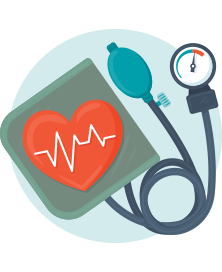Maternal Health Issue
Blood Pressure Disorders

About
Blood pressure disorders of pregnancy refer to a group of conditions that can occur during pregnancy and affect blood pressure levels. These can include gestational hypertension, pre-eclampsia, and eclampsia, and can pose serious risks to both the mother and baby.

Symptoms
You may experience some or all of the below symptoms if you are transiting to menopause
- High blood pressure protein in the urine
- Swelling
- Headaches
- Vision changes.

Treatment
Treatment for blood pressure disorders during pregnancy typically involves close monitoring, medications to lower blood pressure, and in severe cases, early delivery of the baby. Regular prenatal care and monitoring can help detect and manage these conditions early.

Risks
Blood pressure disorders during pregnancy can pose serious risks to both the mother and baby, including preterm labor, placental abruption, organ damage, and even death. Women with a history of high blood pressure or other medical conditions may be at a higher risk of developing these conditions during pregnancy.

Routine checkups
Regular prenatal visits with blood pressure and overall health monitoring, including urine tests to check for protein in the urine and fetal monitoring to ensure the baby's growth and well-being, can help detect and manage blood pressure disorders of pregnancy early, reducing the risks they pose to both the mother and baby.



